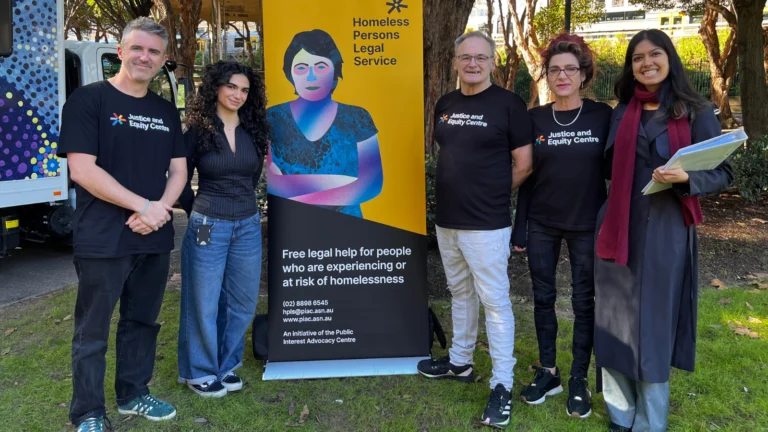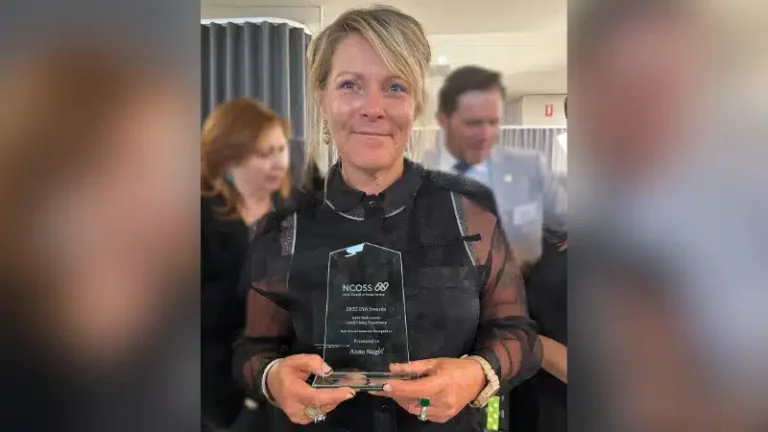The Public Interest Advocacy Centre (PIAC) is an innovative and effective non-profit organisation that provides practical solutions to address disadvantage. It works co-operatively with government, the legal profession, individuals and communities, enabling positive change through advocacy, training, and skills development.
The then NSW Attorney General, the Hon Frank Walker QC, formally launched PIAC on 29 July 1982. The organisation had just four staff: Peter Cashman (Director, 1982 – 1987, pictured), Susan Bothman, Kate Harrison and Jenny Reid.
Over the ensuing years, PIAC staff and board, volunteers and associates, student placements and pro bono supporters have worked together to pioneer public interest advocacy in Australia, providing a voice for the vulnerable, improving access to justice, and finding effective solutions to social problems and systemic disadvantage.
Electricity costs
PIAC’s first case was Arthur Austin’s challenge in 1982 to the retrospective application of electricity tariff increases. As a result of that case, the NSW Government stepped in to legislate against retrospective increases.
PIAC subsequently increased its involvement in utilities, with a particular focus on the fair, transparent and sustainable provision of water, gas, and electricity.
In 1998, the NSW Government provided funding for PIAC’s Utilities Consumer Advocacy Program (later known as the Energy + Water Consumers’ Advocacy Project, or EWCAP).
That funding enabled PIAC to employ dedicated staff to focus on energy and water issues. A recent report released by PIAC and the Physical Disability Council of NSW highlights the inequity experienced by people with disability when it comes to electricity use and pricing. EWCAP has also published Cut Off, a series of reports into electricity, gas and water disconnections in NSW.
Homelessness
Imprisonment of fine defaulters occupied PIAC in its first year, and in subsequent years. PIAC’s strategic advocacy contributed to changes to the law to reduce the rate of imprisonment for fine default. In 2007, PIAC, because of its experience in the Homeless Persons’ Legal Service, achieved further reforms to the fines system to address the disproportionate impact of fines on people who are homeless and others who experience social disadvantage.
Consumer protections
PIAC played a major role in supporting women affected by the faulty intra-uterine device, the Dalkon Shield, sold internationally by an American firm, A.H.Robins Corporation of Virginia.
The Dalkon Shield was linked to a condition called Pelvic Inflammatory Disease, which is a painful infection often resulting in infertility and can require a hysterectomy. Infections generated by the Shield were held responsible for spontaneous abortions and associated septicaemia, and over 15,000 women filed personal injury claims in the US against A.H. Robins.
PIAC’s involvement with the Shield dates from 1983. The Leichhardt Women’s Health Service, then fighting an uphill battle to publicise the effects of the device, asked PIAC to assist in giving legal advice. PIAC helped publicise the US litigation and put individual women in contact with US lawyers.
PIAC’s casework took off after Robins filed for bankruptcy under Chapter 11 of the US Bankruptcy Code in 1985, saying that the outstanding Shield litigation could financially swamp the company. A deadline of 30 April 1986 was set for foreigners to lodge claims against the Dalkon Shield and PIAC helped 1,700 Australians file claims before the due date.
PIAC was involved in extensive litigation regarding HomeFund for much of the 1990s. PIAC represented a large number of low-income homeowners following the collapse of the NSW HomeFund scheme and continued with this work until 2001.
Indigenous justice
In 1983, PIAC assisted the Aboriginal Legal Service to make submissions to the House of Representatives Inquiry into the James Hardy Group mine at Baryugil. In 1984, the inquiry refused to recommend compensation for miners affected by asbestos, despite recognising the barriers that existed for miners and their surviving families in making common law claims. These barriers especially disadvantaged the traditional law widows of Indigenous miners who died after exposure to asbestos at Baryugil.
Recently, PIAC’s work to achieve justice for Aboriginal people has focused on achieving repayment of wages and other monies withheld from Aboriginal people by the NSW Government (through the Aborigines Protection Board and the Aboriginal Welfare Board) between 1900 and 1969.
PIAC’s Indigenous Justice Project has also focused on an appropriate response to the removal of Aboriginal and Torres Strait Islander children from their families. For many people affected by these policies, there are serious barriers to compensation using common law, just as there were for the Baryugil widows.
PIAC continued its focus on health rights through its involvement in the Chelmsford Inquiry into the use of deep sleep therapy at Chelmsford Private Hospital. The therapy, touted as a treatment for depression and compulsive behaviour, had fatal consequences for many Chelmsford patients.
Health
PIAC has maintained an active role in advocating for reforms in the treatment of people with mental illness. PIAC’s recent submission, A Mental Health Act for the 21st Century, draws on our extensive experience working with people with mental illness. PIAC’s submission recommends that a review of the Mental Health Act 2007should take due account of the human rights of people with mental illness.
PIAC’s health-related work also includes projects to reform the law relating to ownership of medical records; campaigns for disclosure of the health effects of pharmaceuticals, human pituitary treatment and silicon breast implants; and work on the regulation and public disclosure of toxic chemical use. In 1991, PIAC published a series of papers on toxic chemicals, and in 1992 it published Toxic Maze.
Access to justice
A recurring theme in PIAC’s work over the past 30 years is access to justice. PIAC led the formation of a Youth Justice Coalition that in 1992 helped to establish a specialist legal service for young people. The National Children and Youth Law Centre opened in June 1993.
PIAC also worked with the NSW Law Society and private law firms to establish the Public Interest Law Clearing House (PILCH) NSW in July 1992. Throughout the following decades, PILCH NSW has enhanced the availability of pro bono assistance in public interest matters, and in 2004, PIAC and PILCH established the Homeless Persons’ Legal Service (HPLS).
With funding from the Federal Department of Family and Community Services, and the NSW Public Purpose Fund, HPLS started with five free legal clinics across Sydney, hosted by the welfare agencies Edward Eager Lodge, Matthew Talbot Hostel, Parramatta Mission, The Station, and Vincentian Village. PILCH NSW members that currently provide lawyers on a pro bono basis to HPLS are Allens, Baker & McKenzie, Corrs Chambers Westgarth, Norton Rose Australia, Dibbs Barker, HWL Ebsworth, Gilbert + Tobin, Henry Davis York, Legal Aid NSW, Minter Ellison and Thomsons Lawyers.
Other PIAC work to improve access to justice has included projects on the law of standing, work on the role of amicus curiae intervenors, and work to expand the scope for class actions and representative proceedings in Australia.
PIAC has a continuing focus on the importance of effective administrative law, including simpler and more accessible administrative law procedures and effective access to government information through freedom of information laws.
Human rights
Much of PIAC’s work involves test cases to protect and promote human rights. PIAC first big case was its representation of six women sacked by Australian Iron and Steel in a complaint of sex discrimination. That case resulted in the landmark High Court decision, Australian Iron and Steel Pty Ltd v Banovic (1989) 168 CLR 165.
PIAC has continued to support applicants in anti-discrimination matters. Highlights included the successful case of Scarlett Finney asserting her right to equal access to education at the Hills Grammar School, and the successful case against the Sydney Organising Committee for the Olympic Games (SOCOG), where the applicant, Bruce Maguire, challenged SOCOG’s failure to provide information in formats that were accessible to him as a blind man.
PIAC has also acted in litigation in respect of a range of other human rights, including free speech and protection from vilification.
In 2006, PIAC acted for Henry Collier in a vilification case. Mr Collier’s complaint related to a series of online statements that asserted the ‘evil and corrupt’ nature of homosexuality. The Administrative Decisions Tribunal found the statements constituted vilification under the Anti-Discrimination Act 1977 (NSW). The Tribunal ordered the offending material to be removed. The case was the first homosexual vilification decision in NSW relating to the posting of material on the internet.
Public transport
Accessible public transport is another important area of PIAC’s work. PIAC joined with the Australian Centre for Disability Law in mid-2006 to initiate a national action campaign on accessible airlines. PIAC client Maurice Corcoran was ultimately successful in his campaign to have airline Virgin Blue change its ‘Independent Travel Criteria’ to alleviate the disadvantage experienced by people with disability.
In March 2011, after a five-year battle, PIAC client Greg Killeen welcomed changes announced by Transport NSW and two large taxi companies that meant so-called wheelchair accessible taxis would finally become wheelchair accessible.
More recently, PIAC represented Graeme Innes, who is blind, in his disability discrimination complaint against RailCorp.
In 2013, Mr Innes celebrated a landmark decision in the Federal Magistrates Court. Mr Innes successfully argued that RailCorp’s failure to provide audible ‘next stop’ announcements on Sydney’s train breached Federal Disability Discrimination law. Mr Innes, who took the case in his private capacity, said: ‘All I wanted was for RailCorp to do what they do for everyone who is able to read print. That is, tell me where I am’.

